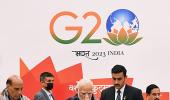'Many countries believe that if they join BRICS, they will be seen as emerging countries and their stature will be enhanced.'
'G-20 still has common action plans while BRICS does not do that much.'

"There is no country from the ASEAN region or from West Africa [in the expanded BRICS]."
"Three Arab countries have been brought in at one go, whereas including Nigeria and Indonesia would have given regional diversity," says Ambassador Gurjit Singh, India's former envoy to Germany, Indonesia, Ethiopia and ASEAN.
"BRICS is not really an alliance; it is a disparate group of countries trying to do economic and development activity together," Ambassador Singh says in a conversation with Rediff.com's Archana Masih discussing the new entrants to BRICS and why countries are eager to find a seat at the table.
- Part 1 of the Interview: 'China did not get its way'
Will an expanded BRICS bring economic and trade advantages to member states?
Economically, Brazil, Russia, India, China plus Saudi Arabia are all in the trillion dollar GDP club. The other member countries are not.
Countries that join BRICS are expected to contribute to the New Development Bank and not only borrow from it. Each member country makes its own share of contribution to the NDB. The original member states make an equal contribution.
The NDB recently admitted Bangladesh, UAE and Egypt. To cite an example, the contribution of UAE is less than Bangladesh.
Therefore, BRICS is not a trading organisation and does not provide any trading preferences. For example, simply because Argentina and India are both in BRICS does not mean the trade between these two countries will go up. Neither does it mean they will buy more defence equipment from us.
All that still remains a bilateral effort.
Since BRICS now includes the top oil producing nations, what economic implications does it have?
Saudi Arabia and the UAE are taking their own decisions on oil pricing and supplies. The oil producing countries already have OPEC [Organisation of Petroleum Exporting Countries].
Every country is taking decisions in their national interest. When BRIC [Brazil, Russia, India, China] was formed, it was a recognition of four large economies having arrived in the world as emerging countries.
Many countries believe that if they join BRICS, they will be seen as emerging countries and their stature will be enhanced.
It is like joining the G-20, but not as good. G-20 still has common action plans while BRICS does not do that much except through the New Development Bank.
I had thought that BRICS expansion would take place in two stages.
Firstly, there would be a criteria based on which 'BRICS Plus' would be constituted. These partner countries would then graduate to full memberships. This is what happens in ASEAN [Association of Southeast Asian Nations] and the Shanghai Corporation Organisation.
Secondly, I thought there would be five new entrants. I was backing Nigeria and Indonesia, but they are not there.

Why were you backing these two countries? What were the reasons?
Nigeria and Indonesia have among the largest GDPs in the developing countries. They are emerging powers. They are democracies and carry heft in their regions.
In not including them, I can deduce that democracy, high GDP, regional representation does not seem to be the criteria.
There is no country from the ASEAN region or from West Africa.
UAE and Saudi Arabia have rising GDP, but Egypt and Ethiopia don't.
Three Arab countries have been brought in at one go, whereas including Nigeria and Indonesia would have given regional diversity.
How has BRICS performed since its formation in 2006? What have been its accomplishments and failures or disappointments?
The New Development Bank is the real success of BRICS, but it only has a paid up capital of $50 billion, which is half its authorised capital of $100 billion. Thirty billion have been deployed:
$7 billion each in India and China.
$5 billion in South Africa and Brazil.
$4 billion in Russia.
The idea of de-dollarisation did not take off although there is greater effort to trade in one's own currency.
NDB has recently raised a RAND bond of 1.5 billion and will soon raise a Rupee bond. This means that when they fund projects in India or South Africa, they can actually lend in local currencies, which reduces the cost of implementation.
And in what areas has it failed?
BRICS did not conduct any joint action during the pandemic or in the Ukraine crisis -- because of Russia in the latter case.
During COVID-19, for instance, each country was doing its own thing. That is why I said that BRICS is not really an alliance; it is a disparate group of countries trying to do economic and development activity together.
Feature Presentation: Aslam Hunani/Rediff.com









